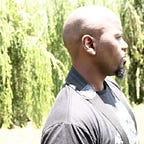Courage: The Lever That Moves The World
“Three things are necessary,” says nineteenth century statesman Charles Sumner: “Number one: Backbone. Number two: Backbone. Number three: Backbone.”
An encouraging start is nothing without backbone, echo's Swett Marden: “A man who cannot stand erect, who wobbles first one way and then the other, who has no opinion of his own, or courage to think his own thought, is of very little use in this world. It is grit, it is perseverance, it is moral stamina and courage that governs the world.”
“I’m the greatest!” said Muhamad Ali and we cheered him on, for he embodied what true sportsmanship is; the human spirit striving to reach its full potential.
It is this drive that keeps us pushing harder and reaching further. If our lives were a movie, we must strive to be the hero in the film and not the loser.
“What good did you do in the world? What did you do with your time? Did you leave the world a better place?” Will be asked of you when your time has come to rest.
“What did you do with the opportunities presented to you? Did you participate in the game of life? Did you play the game? Or were you merely a spectator? Did you score any goals in the playground life?”
Otherwise “Why?” asks Mirabeau, “Should we call ourselves men, unless it is to succeed in everything, everywhere?”
While failure may humble us occasionally, having tried our level best but left hat in hand, we must evermore overcome and keep on moving forward. We must climb back up and regain our dignity, we must earn that crown which we so earnestly sought after.
For “far better it is to dare mighty things, to win glorious triumphs, even though checkered by failure,” says Theodore Roosevelt, “than to take rank with those poor spirits who neither enjoy much nor suffer much, because they live in the gray twilight that knows neither victory nor defeat.”
When Hector, the breaker of horses, and Achilles, the breaker of men, were fighting in the War of Troy, they displayed such invincible courage that their feats — long now since turned to myth — made them immortalized through the words of the poets.
Although these were ordinary men, the challenges of the war brought out the greatest qualities lying dormant within them; it saw them challenged as men, as husbands, as fathers, as citizens. It was their grit to stand, their tenacity to fight on — when duty was heavier than a mountain, and death as light as a feather — that gained them everlasting glory.
“For what more can a mortal ask for?” asked a poet, “Who’s life is as fickle as a leaf, and who’s breath as the turning of the seasons?” Courage alone is necessary, courage alone allows us to brave difficulty and keep on moving with enthusiasm.
“Courage is the most important of all virtues,” says Maya Angelou, “Because without courage, we cannot practice any other virtue consistently.”
“I call for all men!” cried Diogenes in a crowded town platform, after their townsmen had unanimously voted against defending their city against invaders from up north. When the crowd of men began to gather, he shouted scornfully: “I called for men, not pygmies!”
Wanted: A man. Is the clarion call of the world. Strong, confident, people of action. The world cares little for weak people. Just like the songbird which kicks out it’s young before it can fly in favor of the strong, so does nature kick out the weak who show themselves less than their nature.
Nature rewards the strong and courageous — they are the winners in life. If a man shows himself to be anything but his nature, the world conspires against him and all his endeavors. But if he shows himself true to his nature, ‘All the universe conspires in helping him achieve his goals,’ - Paulo Coelho.
Self-confidence is the lever that moves the world.
Believe in yourself and your abilities. Believe yourself capable. If you believe you can, you’re halfway there.
Read more in my new book! The Trials And Triumphs of Hyperachievers
